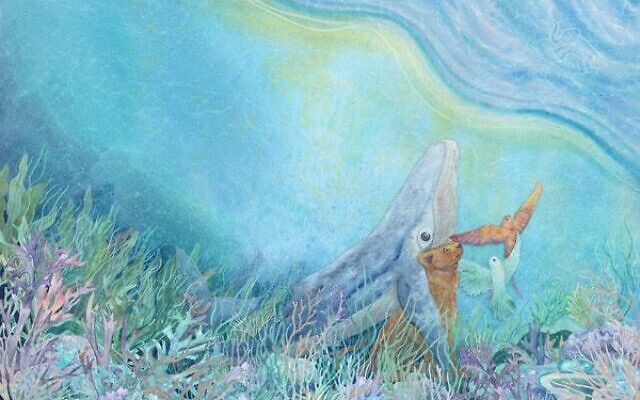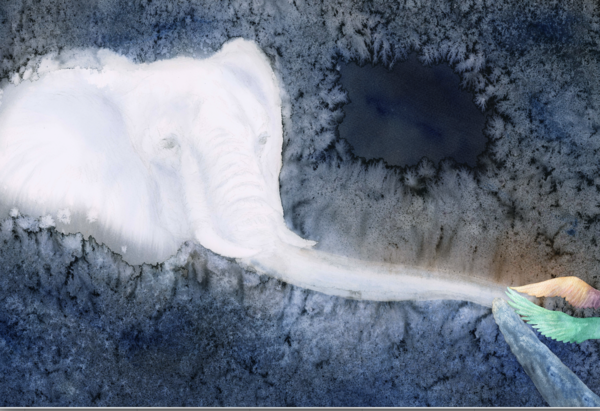To say that Sydney-raised Ryan Abramowitz’s illustrations are multi-layered seems overly simplistic. Each of his tenderly drawn images smoulder between light and shade, dancing with nuance and complexity. His sketchings are weighted in honesty, drawing on the natural world to grapple with one of the most universal of human experiences.
Grief and loss.
Specifically, the unique grief and loss that comes with the passing of a loved one – to suicide.
Ryan was just 26 years old and living in Copenhagen when he received the phone call from his sister: their dad had taken his own life.
Within four hours, Ryan was on a plane home.
“Everything was a blur from that time. I remember going from spring into autumn. I think I just registered seasonal changes because everything else was just too hard to comprehend.”
Seasons slipped into years; over six of them had since passed. In the stillness of a COVID lockdown, Ryan looked out from his balcony when his imagination took flight. He pondered how one could illustrate spirit through the language of animals – anthropomorphism.
Across the sky, he saw his father in the form of an elephant.
“Like an elephant, he was very kind and sensitive, very quiet and very gentle. He had a large physical presence.”
“Drawing it was hard. Every time I drew the elephant walking away from his family, it was soul-wrenching.”
With that, Ryan took to his sketchbook. He drew an elephant, with his soul walking away from his body.
It was the beginning of a whole series.
“And then I realised there was something bigger that sat behind it. I thought, what is the story that sits behind this drawing when children seek out their father’s soul? If we could have this opportunity to ask those who chose to leave Earth, what would those questions be?
“When someone loses a loved one to suicide, it leaves unique textures of grief. There are feelings of abandonment, like, why did they leave me? The guilt. Did I contribute to it? Did I do something wrong? On either side of that, did I not do enough? You agonise over the causality.
“But, of course, it’s never anyone’s actions that contribute to that. The person didn’t choose to leave someone; they chose to leave their pain.”
It then dawned on Ryan that a picture book would be an accessible format to wrestle the enormity of such ideas, and the complexity of anyone coming to terms with loss – especially those bereaved by suicide.
“Understanding these things is messy. There’s a lot of shadow and fog and confusion. And so I thought a picture book is ideal to speak to those questions and answers.”
A few months later, Ryan enrolled in a course for writing picture books. He armed himself with an editor/art director with a background in visual neuroscience, and underwent rigorous consultations with children’s psychologists, grief counsellors, and suicide and bereavement researchers.

With an abyss of accessible information for children on the topic, Ryan was committed to not only telling his family’s story in words and pictures; but to provide a resource of healing.
The writing process was a balancing act between following the traditional conventions of the form – character development, rising climax, resolution, etc – but being careful not to draw causality as to why someone suicides. Ryan treated language with immense care, to ensure it wasn’t triggering.
“It’s the artwork that does the heavy lifting.
“I started visualising an elephant traversing the sky; its form manifest in the constellations. Between the sea and these stars in Elegy for an Elephant, a whale (my embodiment) and two birds (my twin sisters), go searching for their father’s soul, joined by a lioness (my mum).”
Elegy for an Elephant was born.
The result is 37 pages of intricate illustrations that heave with emotion; the tumultuousness of feeling, conveyed in colour, texture and expression laid deep behind eyes.
“It felt like the mood would come through the window. I felt like my dad was in the room. And sometimes I felt like I would put out my hand and this cosmic star dust was blowing through me.”
The drawings are also rich with symbolism, with Ryan drawing on his Jewish faith.
“There are 18 starfish,” he tells, 18 being the symbol of “chai – life”. (Further, Ryan is donating 18 per cent of all book profits to mental health services including Lifeline, Movember and Support After Suicide Services.)
The narrative also nods to Jewish mourning rituals of prayer and remembrance through the lighting of candles.
While the motifs of the book centre on nature, it is also quite literally imbued in the illustrations, with Ryan infusing sea water from Cape Town, South Africa – the birthplace of his father – into the paint.
“I think there’s a really stunning synergy between tears and the ocean.”
Suicide is the leading cause of death in Australia for those aged 15-44, with over 3000 deaths occurring each year.
On average, that’s nine deaths per day.
Nine worlds that end abruptly – countless more forever broken as bereaved loved ones grapple with the gaping hole left behind.
In the process of Ryan’s creation of Elegy for an Elephant, he was forced the face the depths of his grief.
“I think of it as like the bottom of a riverbed where everything had settled. And I had to agitate all the sediments, in order to authentically create, relive, negotiate and confront my dad’s death in such an intense and deliberate way.”
On the personal toll of such a journey, Ryan says it was “retraumatising” and “incredibly fatiguing”.
“I re-read his letter. I went through my diaries from the period that he died. I listened to a recording I had made before his funeral where I say goodbye to him.
“Drawing it was hard. Every time I drew the elephant walking away from his family, it was soul-wrenching.”
Concerned friends told him to put the project on hold.
“But if I didn’t continue with it, I would never do it.”
And so, the creation process became steeped with ritual: Ryan set his phone to airplane mode, pressed play on music composed by Ludovico Einaudi, poured himself a gin, and put on his kippah.
“I’m very spiritually resonant, but I feel like I’ve developed a much more active relationship with Hashem through this book,” reflects Ryan.
“It felt like the mood would come through the window. I felt like my dad was in the room. And sometimes I felt like I would put out my hand and this cosmic star dust was blowing through me.”
In many ways, Ryan’s personal healing journey mirrors the narrative of the book: finding light after darkness.
“I guess what kept me going was this internal knowing: I had to do this book. This is my purpose.”
At the intersection of languages – visual and written – Ryan found greater acceptance.
“Yes, it was incredibly triggering before it became healing. But this book is the first time I’ve been able to make sense of why my dad died, or why I experienced a parent who died by suicide.”
Musing on the final illustration – the elephant, whale, lioness and two birds joined together once more – Ryan bestows a hope for anyone who should turn the pages of his book while in the grips of grief.
“This book really is about the timeless nature of love, and I hope readers feel less alone in their grief.
“For those who have lost someone to suicide, I hope they feel reassured that they held no responsibility, that they were not to blame and that they were loved. I hope they feel reassured that the heavier days will lift.
“Our loved ones live on in us and through us, in everything we do, and in the kindness we display. That love transcends everything.”
Elegy for an Elephant will be released on World Suicide Awareness Day – September 10, 2023.
An art exhibition: An elephant’s migration across picture book plains by Ryan Abramowitz will be held at Brightspace Gallery St Kilda from September 13-24. Ryan will be holding a one night only author talk on November 15 at Bondi Beach.
For more information, or to order your copy of the book, visit narrativesofnature.com.
If you’re worried that someone’s life is in immediate danger, call 000 or go directly to your local emergency services. For additional support, contact Lifeline: 13 11 14 Suicide Call Back Service: 1300 659 467 Beyond Blue : 1300 224 636


comments